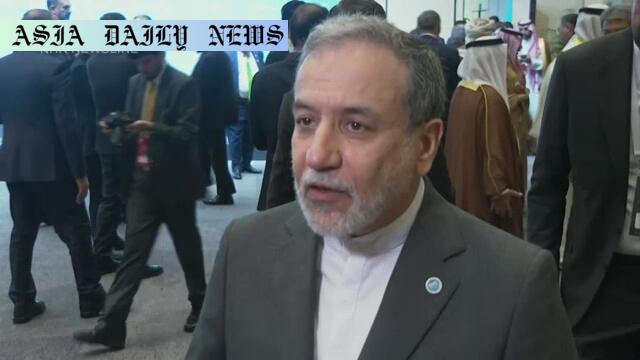Iran-Israel Conflict: Iranian FM Abbas Araghchi demands a halt to Israeli airstrikes before entering negotiations with the US.

The Escalating Iran-Israel Conflict: An Overview
The tensions between Iran and Israel have reached a critical point following continued airstrikes and military engagement from both sides. Recently, Iranian Foreign Minister Abbas Araghchi emphasized that negotiations with the United States cannot proceed while his country faces bombardment from Israeli forces. This ongoing conflict has drawn further attention from international bodies, with Araghchi making these statements before attending an Organization of Islamic Cooperation (OIC) meeting in Turkey. The volatile nature of these interactions sheds light on the fragile state of Middle Eastern geopolitics.
Iran’s Stance: Military Resilience and Diplomatic Challenges
Addressing reporters in Turkey, Araghchi strongly condemned Israel’s airstrikes and expressed an unyielding demand that such attacks must cease before Tehran considers engaging in talks with Washington. These sentiments echo Iranian frustrations over Israel’s reported targeting of missile infrastructure in Isfahan, including allegations of strikes near a nuclear site. Although Iranian media insists there has been no leakage of radioactive materials, the psychological and geopolitical impact of such accusations can hardly be overstated.
Israel’s Rationale for Preemptive Airstrikes
On the other hand, Israeli officials maintain the legitimacy of their strikes as defensive measures against perceived threats. Reports from Israel indicate that Iran-backed drones have targeted Israeli civilian areas, including a home in northern Israel. Such actions, according to Israeli defense strategies, necessitate a proactive response to neutralize potential threats to national security. However, this approach has intensified regional tensions, making it even harder for diplomatic resolutions to take root.
US Mediation and Regional Responses
The United States finds itself in a precarious position amid these hostilities. While the Trump administration has previously presented itself as a potential negotiator, the immediate challenge lies in balancing its alliances and encouraging de-escalation. Trump’s public comments suggesting it is ‘difficult to request de-escalation when someone is winning’ reflect a nuanced stance that complicates diplomatic efforts. Meanwhile, other regional players, including Turkey, have utilized platforms like the OIC to condemn the violence and urge for peace. These collective efforts underscore the need for multilayered solutions to the escalating crisis.
Regional Security and Global Implications
The apparent risk of further escalation between Iran and Israel presents a clear danger to the broader Middle East. Military skirmishes in sensitive regions, particularly those involving nuclear infrastructure, bring the possibility of cross-border conflicts and proxy wars to the forefront of international concern. With Iranian and Israeli officials standing firm on their respective positions, finding common ground appears increasingly elusive. In the absence of dialogue and compromise, the likelihood of sustained violence could yield far-reaching consequences for global stability and security.
Commentary
Understanding the Stakes in the Iran-Israel Conflict
The latest developments in the Iran-Israel conflict are a stark reminder of the delicate balance required to navigate Middle Eastern geopolitics. This is not merely a regional issue; instead, it has profound global implications, particularly when nuclear facilities and state security are under threat. With escalating rhetoric and military strikes, both nations appear firmly entrenched in their positions, creating a particularly challenging environment for diplomatic solutions to emerge. Understanding the context, motivations, and potential consequences of these actions is essential to grasp the urgency of this situation.
The Role of the United States in De-Escalation
US involvement in this conflict is, without a doubt, pivotal yet fraught with complexities. While Iran seeks a form of security against Israeli aggression before negotiating with Washington, the US has often leaned toward an alliance with Israel. This delicate balancing act puts the US in the uncomfortable position of attempting to mediate without compromising its own strategic interests. However, if any progress is to be achieved, US diplomats must push for actionable solutions that include mutual concessions from both sides. Whether or not the US has the political will to assume such a role remains a key question.
Why Diplomatic Efforts Must Prevail
Diplomacy, despite being under immense strain, remains the most viable option for enduring peace in the region. With regional and global stability at risk, the international community, including organizations like the United Nations and the OIC, must intensify their efforts to avert prolonged conflict. Proposing ceasefires and confidence-building measures could allow all parties to create an atmosphere conducive to dialogue. Failure to prioritize diplomacy may only deepen the cycle of violence, leading to devastating consequences for the region as well as the world at large.


